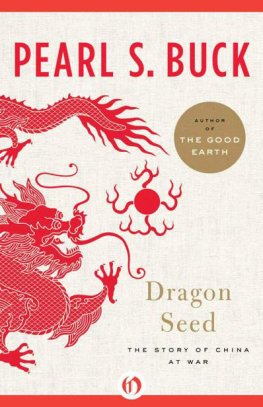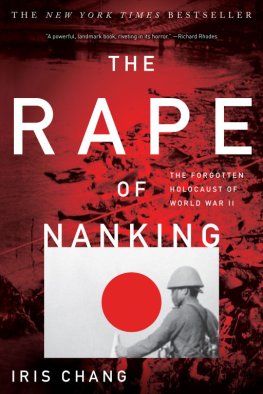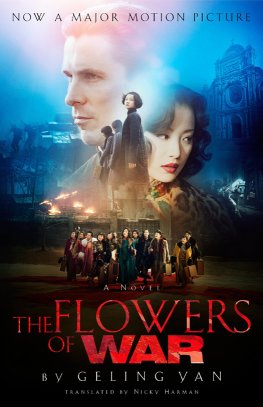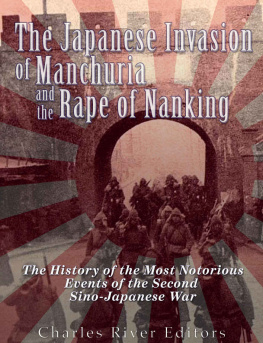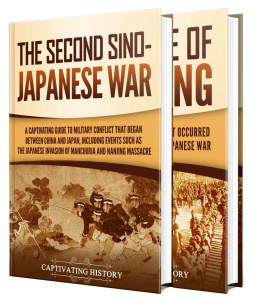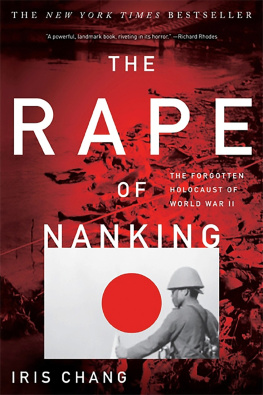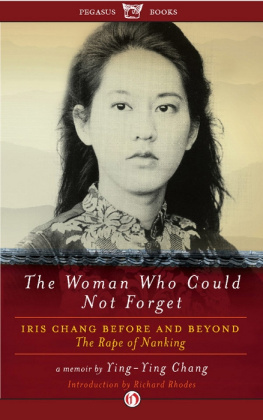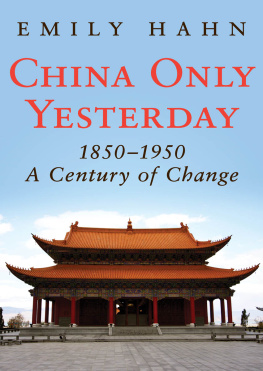Zhang Sheng - The Rape of Nanking: A Historical Study
Here you can read online Zhang Sheng - The Rape of Nanking: A Historical Study full text of the book (entire story) in english for free. Download pdf and epub, get meaning, cover and reviews about this ebook. City: Oldenburg, year: 2021, publisher: De Gruyter Oldenbourg, genre: History. Description of the work, (preface) as well as reviews are available. Best literature library LitArk.com created for fans of good reading and offers a wide selection of genres:
Romance novel
Science fiction
Adventure
Detective
Science
History
Home and family
Prose
Art
Politics
Computer
Non-fiction
Religion
Business
Children
Humor
Choose a favorite category and find really read worthwhile books. Enjoy immersion in the world of imagination, feel the emotions of the characters or learn something new for yourself, make an fascinating discovery.

- Book:The Rape of Nanking: A Historical Study
- Author:
- Publisher:De Gruyter Oldenbourg
- Genre:
- Year:2021
- City:Oldenburg
- Rating:3 / 5
- Favourites:Add to favourites
- Your mark:
- 60
- 1
- 2
- 3
- 4
- 5
The Rape of Nanking: A Historical Study: summary, description and annotation
We offer to read an annotation, description, summary or preface (depends on what the author of the book "The Rape of Nanking: A Historical Study" wrote himself). If you haven't found the necessary information about the book — write in the comments, we will try to find it.
The Rape of Nanking: A Historical Study — read online for free the complete book (whole text) full work
Below is the text of the book, divided by pages. System saving the place of the last page read, allows you to conveniently read the book "The Rape of Nanking: A Historical Study" online for free, without having to search again every time where you left off. Put a bookmark, and you can go to the page where you finished reading at any time.
Font size:
Interval:
Bookmark:

ISBN 9783110652338
e-ISBN (PDF) 9783110652789
e-ISBN (EPUB) 9783110652895
Bibliographic information published by the Deutsche Nationalbibliothek
The Deutsche Nationalbibliothek lists this publication in the Deutsche Nationalbibliografie; detailed bibliographic data are available on the Internet at http://dnb.dnb.de.
2021 Walter de Gruyter GmbH, Berlin/Boston
The great massacre perpetrated by the Japanese army in Nanjing shocked the world. From then until now, there have been relentless attempts to uncover the reasons behind this tragedy. The themes that usually catch the eye are Japanese militarist education, insufficient supply in the Japanese armys rear, as well as the related themes of the policy of local requisitioning, the grievous casualties the army had suffered in the siege of Nanjing and their psychology of retribution, slackening of military discipline, and so on. These studies have doubtlessly added to our understanding of the Rape of Nanking.
However, other works have noted that conditions such as the policy of local requisitioning were part of the overall Japanese invasion of China, but that the massacre of the inhabitants of a captured city such as Nanjing was rare indeed (of course, wherever the tip of the spear of the Japanese army landed, it caused great loss of life and property). Why did the Rape of Nanking occur even as the Japanese army was hoisting the banners of just war? To what extent was the Rape of Nanking a random mistake or inevitable within the overall Japanese war of invasion?
Writers have come to feel, through their considerations and studies, that one cannot accurately understand the outbreak of the Rape of Nanking separately from the overall Japanese war plan for the invasion of China. That is because the conflict between Japan and China was the primary conflict in East Asian international relations of the time, and Japan was the primary party of said conflict. If we hold tightly to the Japanese sides thinking and decisions, we can clearly assess the strategic opportunity taken for the Japanese invasion of China.
The strategic reason Japan chose to launch an all-out war of invasion on China was that China had made breakthrough progress in state organization primarily to resist Japanese power; so if war hadnt been launched immediately, it would not only have been impossible to defeat China, but China may have ultimately reclaimed sovereignty of the Northeast (Manchuria).
The Marco Polo Bridge Incident was previously understood as the catalyst for mid to long-range plans for the Japanese following the Eastern Conference, as reflected in the Tanaka Memorial. Shigemitsu Mamoru, Japans representative at the signing of the unconditional surrender, said: Later events in East Asia and corresponding actions taken by Japan took place exactly in accordance with the steps outlined in manuals like the Tanaka Memorial, and so it is difficult to clear up foreign suspicions regarding the Tanaka Memorial (Shigemitsu 1987, 20). The Marco Polo Bridge Incident was certainly one step in Japans overall invasion of China.
It is, however, undeniable that the there was a degree of randomness on the surface of the Marco Polo Bridge Incident. Why did the Japanese launch an all-out invasion of China only six months after the Xian Incident? Why the Japanese military resolutely push forward its all-out war of invasion while people like Ishiwara Kanji (head of the Japanese Army General Staff Office at the time of the Rape of Nanking), primary planner of the Mukden Incident, and others opposed war at a time when Chinas strength was depleted, thereby creating disadvantageous conditions for Japans preparations for war on the Soviet Union? I will attempt to, on the basis of fragmentary evidence, attempt to assemble a complete picture departing from a few points seldom noticed previously.
Suma Yakichiro served as consul-general of Japan in Nanjing, a position he left on January 18, 1937. On March 15, he gave a speech at the Japan Industrial Association titled Present and Future of Japan-China Relations. This is an important document worthy of our deep study today because it represents contemporary Japanese judgments of conditions in China at the time, and also demonstrates the logic the Japanese employed in launching their all-out war on China.
In Sumas estimation, the Xian Incident demonstrated that China was now unified, and this unity created an unprecedented situation in the history of modern China: During the First Sino-Japanese War, if you went to Sichuan, Yunnan, or other mountainous provinces, most people did not know their country was currently fighting a war with Japan. Of course, this was also attributable to reasons such as poor transportation links. It was just this China with its complete lack of concern for external affairs that, upon hearing of the Suiyuan Offensive, launched into a nationwide movement of support for the Suiyuan army in all parts of the country, with some places ceasing broadcast of dancing music for three days, and even dance halls in some places sending 20 percent of their revenues in support of the Suiyuan army; you could thus see how zealous they were. Whats more, even the inmates of a prison in one place donated funds to the Suiyuan army; this would seem unprecedented anywhere in the world. Where does this zealousness come from? I just spoke of the two levels of Chinese feelings toward Japan anti-Japan sentiments among the common Chinese people have become very serious, and the Suiyuan Offensive is just the yardstick for measuring that seriousness.
As his listeners were all magnates with their hands on the levers of the Japanese economy, Suma continued in extreme earnestness, concluding that it was Japans actions that had led to the new conditions in China. There were two goals, or maybe we should say two situations, that led to this unity. The first was oppression from Japan. Of course, I should rather say that it was just this oppression that gave China an opportunity to move toward unity; I think this is a fact beyond argument. Even though the Chinese are now saying that Chinas strength is growing with the stabilization of the foundation [of] Chiang Kai-sheks regime that we see today, there are actually two reasons afoot: the first is Japans invasion, and the second is Its actually very interesting once you start talking about it. Ill go ahead and say it out loud: its Yu Youren, director of the Control Yuan. Suma concluded that the reason behind unification was: This so-called unification could not be brought about on the strength of warlords or the government alone, but was as symbolized by the student movement; it was realized only after the aspiration for unification had deeply penetrated the hearts of the people and become a movement of national unanimity.
According to modern theories on nationalism, external threats and feelings of hatred for an enemy constitute a basic model for the construction of a nation-state (Gellner 2002). Suma provided anecdotal evidence backing this theory: In 1931, that being six years ago, the nationalist government hired the German Hans von Seeckt. Chiang Kai-shek asked him two questions. The first was how to make Chinas army strong, and the other was what kind of policy he should adopt toward Japan. To the first question von Seeckt responded: if China wishes to become stronger than Japan, weapons are necessary, airplanes are necessary, but from my experiences in organizing and running the German Defense Force, the most pressing task for China at present is to cultivate among the military a mentality of viewing Japan as the enemy. Here the veracity of Sumas evidence is not important. What is important is that this became the thread that tied his discourse together, i.e. that the unification of China was closely related to Chinese opposition to Japan, or in other words further unification of China necessarily meant intensification of anti-Japan sentiments there, in Sumas estimation.
Font size:
Interval:
Bookmark:
Similar books «The Rape of Nanking: A Historical Study»
Look at similar books to The Rape of Nanking: A Historical Study. We have selected literature similar in name and meaning in the hope of providing readers with more options to find new, interesting, not yet read works.
Discussion, reviews of the book The Rape of Nanking: A Historical Study and just readers' own opinions. Leave your comments, write what you think about the work, its meaning or the main characters. Specify what exactly you liked and what you didn't like, and why you think so.

